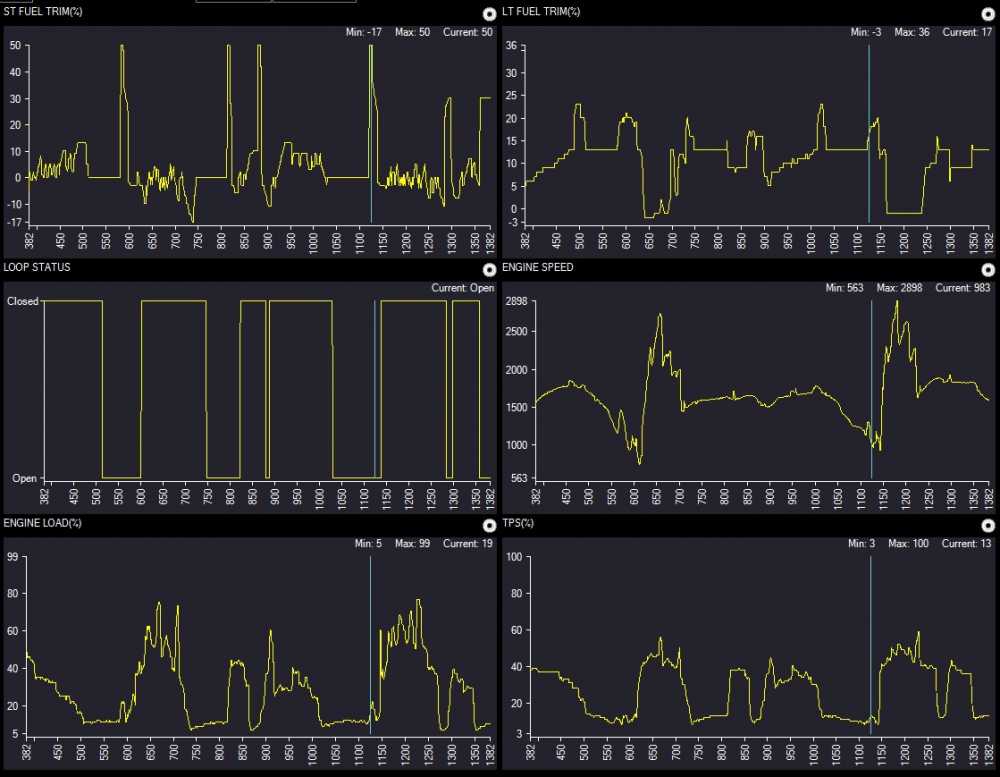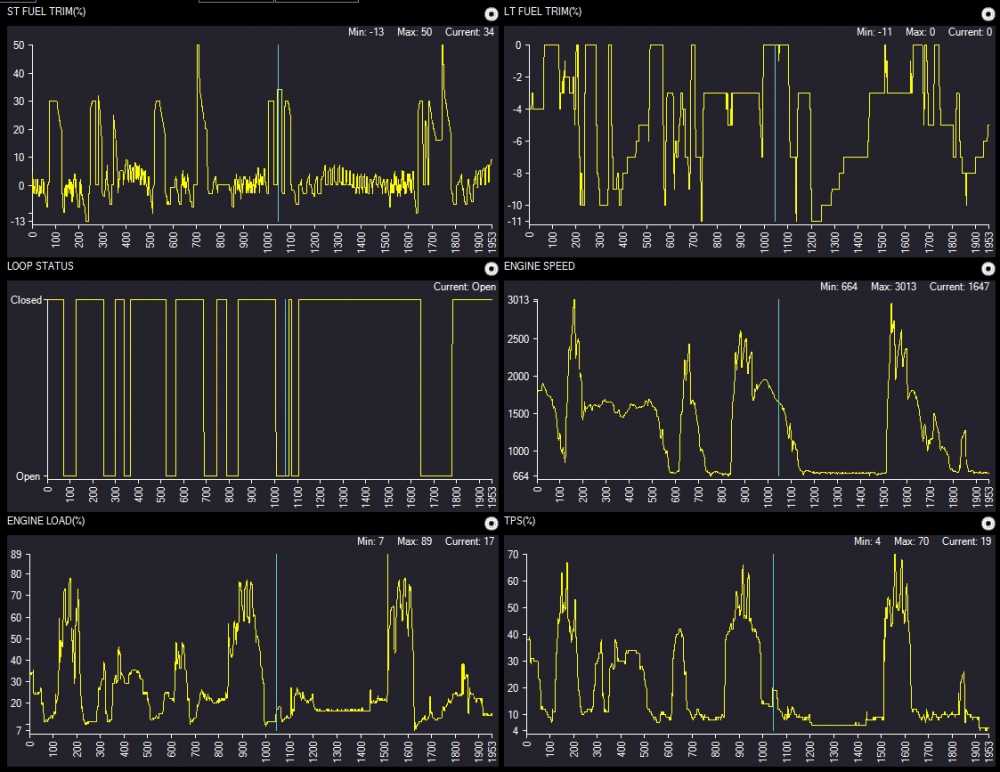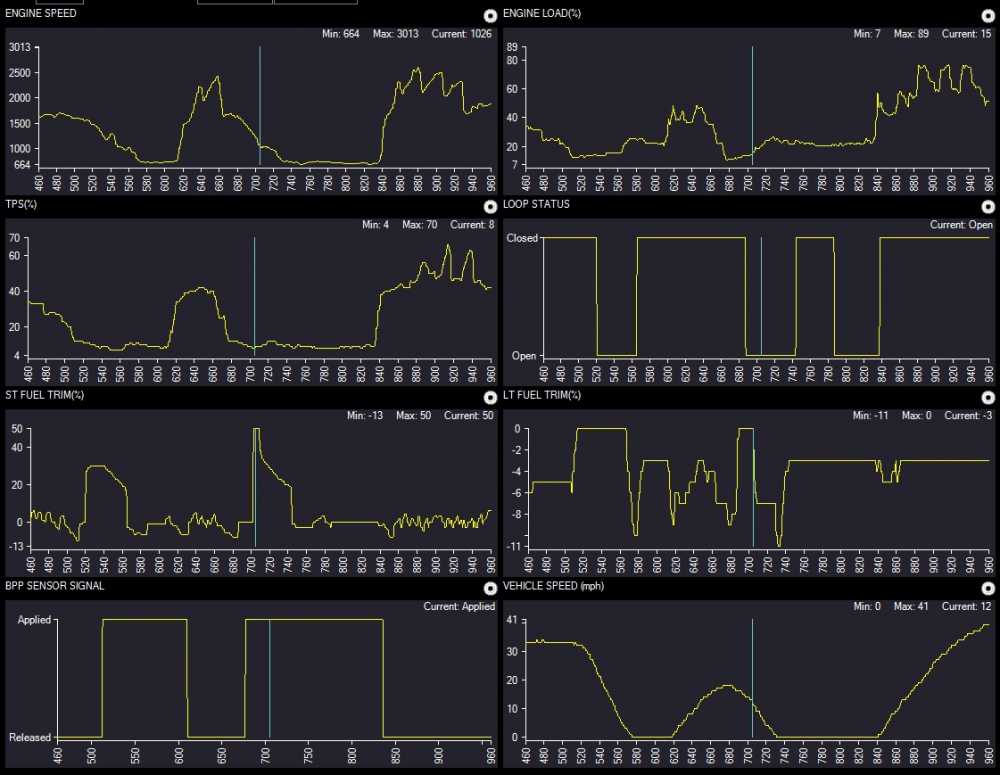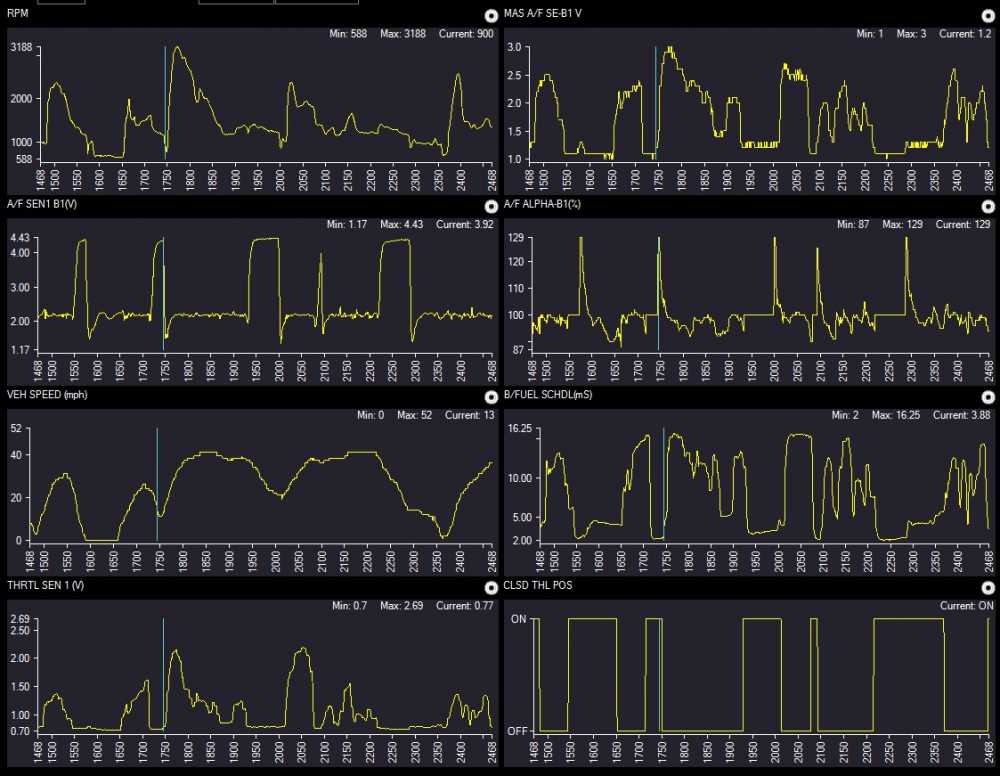Chevrolet sonic 2015 fuel trim
- andyford
-
Topic Author
- Offline
- New Member
-

- Posts: 7
- Thank you received: 3
Please Log in or Create an account to join the conversation.
- Tyler
-

- Offline
- Moderator
-

- Full time HACK since 2012
- Posts: 6064
- Thank you received: 1531
I ask because it's not unusual to see brief spikes of 50% or more on short term while driving, as the PCM moves back and forth between open and closed loop. Here's an example off a 2012 Cruze:
The first picture definitely has a fuel control problem (failed intake one-way valve), but the second is after the repair. Both show the unusually high short term spikes.
Anyway, if it's just something you're seeing briefly and fuel trims look good otherwise, then I wouldn't sweat it.
Please Log in or Create an account to join the conversation.
- GeekDIYMechanic
-

- Offline
- Premium Member
-

I know that many PCMs left closed loop status when TPS is considered WOT, but I'm not seeing that here. Right? And, I thought that was because the O2 couldn't really give the PCM a good reading in the desired performance A/F, e.g. 12:1, range.
Likewise looking at your graphs, it appears upon deceleration it also drops out of closed loop as well. I'm guessing for the same reason as the WOT status with an O2.
Did I just answer my own question? LOL
What is causing the PCM to get out of closed loop? The reason I ask is I thought the tailpipe is cleanest in closed loop.
Please Log in or Create an account to join the conversation.
- Tyler
-

- Offline
- Moderator
-

- Full time HACK since 2012
- Posts: 6064
- Thank you received: 1531
GeekDIYMechanic wrote: Likewise looking at your graphs, it appears upon deceleration it also drops out of closed loop as well. I'm guessing for the same reason as the WOT status with an O2.
Did I just answer my own question? LOL
Yep! :lol: During fuel cut decel is when I see this behavior the most often, at least on the Chevy Cruze and Sonic. Just to be sure I was telling you right, I went back to the post-repair capture and added a couple more PIDs.
With a couple exceptions, the open loop events are always associated with the vehicle slowing down. :blink:
What is causing the PCM to get out of closed loop? The reason I ask is I thought the tailpipe is cleanest in closed loop.
That's what I thought, too! :silly: But it seems like the PCM is actually eager to get OUT of closed loop? I've noticed similar behavior on other newer model vehicles, not just GM's. Here's a shot from a 2012 Nissan Rogue. It took any excuse it could find to go into fuel cut (high voltage on the A/F sensor). It even has the same kind of short term spikes as the Cruze.
www.scanshare.io/share/acu6f1Lofk6YwAmKhhrDyw
Please Log in or Create an account to join the conversation.
- Noah
-

- Offline
- Moderator
-

- Give code definitions with numbers!
- Posts: 4957
- Thank you received: 1111
"Ground cannot be checked with a 10mm socket"
Please Log in or Create an account to join the conversation.
- Tyler
-

- Offline
- Moderator
-

- Full time HACK since 2012
- Posts: 6064
- Thank you received: 1531
Please Log in or Create an account to join the conversation.
- GeorG
-
- Offline
- Senior Member
-

- Posts: 56
- Thank you received: 6
andyford wrote: Hi guys , i have this chevrolet sonic 2015 with a lean code p0171 i found intake hose was broken , but i went to live data and for my surprise i found fuel trims but no like i used to see -10 or +10 number , it was more like number going all the way for example 50 54 etc. I try to find some info how to read this but unfortunately didn't find anything. Appreciate the info guys thanks a lot !
Try using generic OBD 2 live data, I have found that sometimes nissan, honda and toyotas are very peculiar with their OEM data stream. I know this is a Chevy but you dont have anything to lose. Remember substitute values?
Just try it.
Please Log in or Create an account to join the conversation.
- SniperDan
-

- Offline
- Senior Member
-

- Posts: 78
- Thank you received: 28
GeorG wrote:
andyford wrote: Hi guys , i have this chevrolet sonic 2015 with a lean code p0171 i found intake hose was broken , but i went to live data and for my surprise i found fuel trims but no like i used to see -10 or +10 number , it was more like number going all the way for example 50 54 etc. I try to find some info how to read this but unfortunately didn't find anything. Appreciate the info guys thanks a lot !
Try using generic OBD 2 live data, I have found that sometimes nissan, honda and toyotas are very peculiar with their OEM data stream. I know this is a Chevy but you dont have anything to lose. Remember substitute values?
Just try it.
Agree with this. I have gotten in the habit of heavily relying on commanded and actual Equivalence ratio's so as to not dig too deep into fuel trim value substitution. Each vehicle defaults this value a little differently for things like fuel cut/decel, WOT, even gear changes. Commanded and Actual Eq. Ratio will hardly ever lead you astray as to what the engine computer is doing, and if they match the vehicle is without a doubt in fuel control.
"Without data, you are just another person with an opinion."
~W. Edwards Deming
Please Log in or Create an account to join the conversation.




